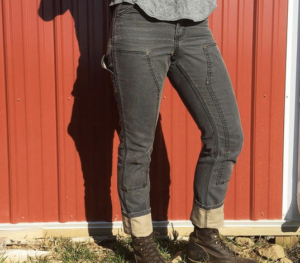LocalHarvest Newsletter: We All Wear Pants
 Welcome back to the LocalHarvest Newsletter.
Welcome back to the LocalHarvest Newsletter.
A week ago I attended the Northwest Meat Processors Association annual conference, held this year at the beautiful Lake Coeur d’Alene, Idaho. I went for my day job where I have the pleasure of assisting small, niche meat processors make their businesses more sustainable and thriving. It probably sounds like a bizarre job for many of you, but I absolutely love it. I have worked with farmers for a couple decades now, but the food processing sector and all of the links in the chain of local food production and distribution may be even more critical for the long-term viability and growth of local foods. They are the invisible actors that transport, slaughter, wash, cut, box, bag, cool, and distribute many of the foods that you enjoy. Because of my background raising animals and direct marketing meat, I am intimately familiar with just how important the meat processors of this country are to my business. You literally cannot have local meat without local slaughterhouses.
I wanted to share an epiphany I had as a result of attending this conference. It may seem small and insignificant, but each nugget of wisdom that I acquire in life is important to me. For many of you, this won’t be a revelation because you already live life in the “radical center”. I applaud you for that.
While at the conference, I conducted several short video interviews with any meat processor willing to speak to me before a camera. I also facilitated a roundtable discussion about the opportunities and challenges for Northwest meat processors. Almost every single meat processor I talked to was enthusiastic and excited about the growth of the local food movement and consumers wanting to better understand where their meat comes from. They saw this as both critical to keeping their small businesses afloat but also to bridging the so-called “urban/rural divide” and engendering a higher level of respect and support for family farmers, ranchers, and small food businesses.
There is no doubt about the trends- our country is getting more urbanized. Rural America is de-populating, meaning less people hang out in rural areas, or have rural relatives, or have a deep, visceral understanding of agriculture and management of working lands. But if people from metropolitan America truly want more local food, there is a tremendous opportunity to build a relationship of mutual respect and transparent, educated engagement. Instead of loathing each other for some supposed fashion choices, political bent, or level of formal education, why not come together in our commonalities? Those could include our support for local food, local farms, quality and craftsmanship, and economic interdependency.
I see this mental divide where I live, which is both rural and agricultural but also touristy and increasingly so. I frequently hear the message from friends and neighbors that the skinny-jean wearing, Instagram obsessed crowd should just stay away and stop crowding our local hiking trails or favorite pizza and beer joints. But yet we are just as dependent on them to buy our agricultural goods, our lumber, and our recreational experiences as they are dependent on us to produce those things for them. So instead of an all out Carharts vs. skinny jean war, why not realize we both like to wear pants and we are in this boat together?
The other part of the epiphany that I experienced from this conference was that by focusing on the things we had in common and the humanity of each individual that I met, I could hear them and put our potential political differences aside. Many of us live in echo chambers where the people we surround ourselves with are a reflection of our personal values, perhaps even an exact replica of our own. I have purposely broke free of that way of living since I was in my early, dogmatic 20s. Working in and around agriculture has been an excellent opportunity for me to meet and collaborate with others who are decidedly not in my echo chamber. I thrive on that challenge and make a special effort to listen and get to know folks who have vastly different philosophies than my own (religious, political, social, etc). I used to have a bumper sticker on my car that read: “A mind is like a parachute- it only functions when open”. I am only now starting to understand that bumper sticker that I carried around in my 20s like a badge of honor. When you find common ground with people of diverse backgrounds and ideologies that is where the magic of human connection happens. It is the seed you plant that will grow into something beautiful.
So next time you interact with your local butcher or farmer and make assumptions about him/her, or conversely the next time you interact with a bike-riding skinny-jean wearing young person, cast your stereotypes aside, strike up a friendly conversation, and listen. Try to identify some things you have in common and grow from there. Good food is often a great unifier- start there. The only rural/urban divide is in our minds.
Kindly,
-Rebecca Thistlethwaite